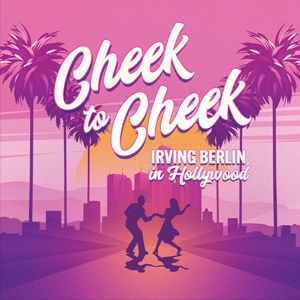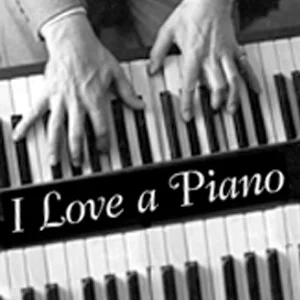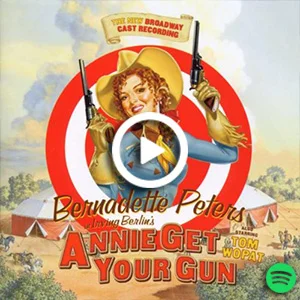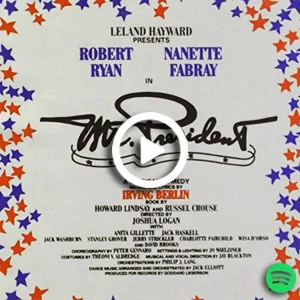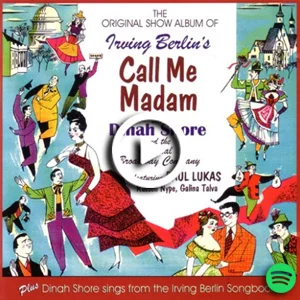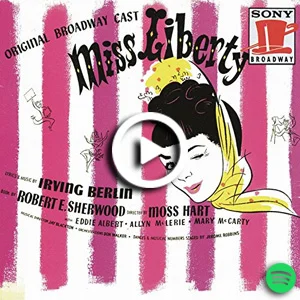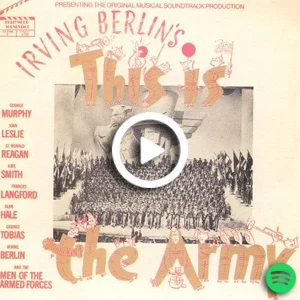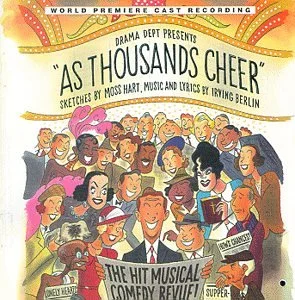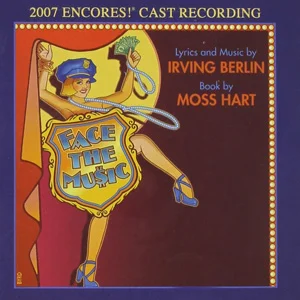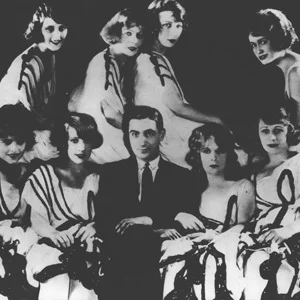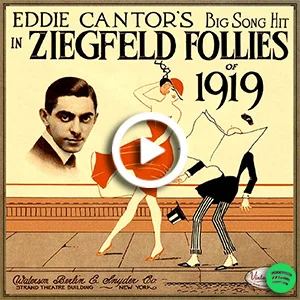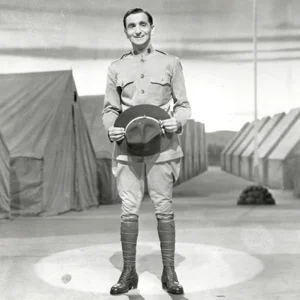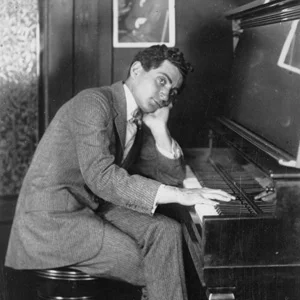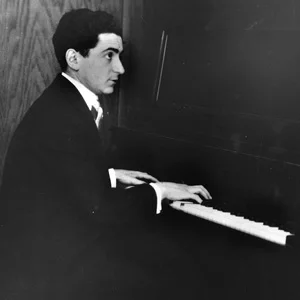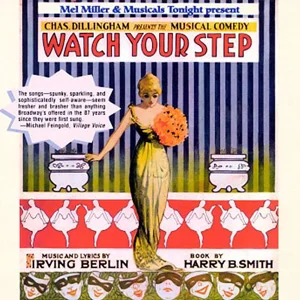stage
Irving Berlin wrote seventeen complete scores for Broadway musicals and revues, and contributed material to six more. Among the shows featuring all-Berlin scores were The Cocoanuts, As Thousands Cheer, Louisiana Purchase, This Is The Army, Miss Liberty, Mr. President, Call Me Madam and the phenomenally successful Annie Get Your Gun.
As well as writing the scores for musicals during his lifetime, Irving Berlin's music has also provided the inspiration and the score for more recent shows - which have been hugely successful on Broadway, London's West End and beyond. These include Holiday Inn, Top Hat, White Christmas, Cheek To Cheek and I Love A Piano.
White Christmas, Dominion Theatre London, Jamie Wilson Productions. Photo: Grahame Larter
For performance rights to licence an Irving Berlin show, song, or concert, please contact Concord Theatricals for further information.
Recent shows inspired by irving Berlin's Music
Cheek to Cheek (2021)
Cheek to Cheek: Irving Berlin in Hollywood is an all-singing, all-dancing celebration of the most famous songs that Irving Berlin composed for the silver screen. Irving Berlin understood the power of dance, and his melodies, rhythms and lyrics reflected his love of the art form. In this crowd-pleasing revue, six performers showcase Berlin's magnificent songs, telling the stories behind the man who made the music that made the movies dance.
Holiday Inn (2016)
Jim leaves the bright lights of show business behind to settle down on his farmhouse in Connecticut... but life just isn't the same without a bit of song and dance. Jim's luck takes a spectacular turn when he meets Linda, a spirited schoolteacher with talent to spare. Together they turn the farmhouse into a fabulous inn with dazzling performances to celebrate each holiday, from Thanksgiving to the Fourth of July. But when Jim's best friend Ted tries to lure Linda away to be his new dance partner in Hollywood, will Jim be able to salvage his latest chance at love?
Top Hat (2011)
Top Hat brings the glamor of Hollywood’s golden age and the glorious, tap-dancing magic of Fred Astaire and Ginger Rogers to the stage in one of the greatest dance musicals of all time. Packed full of Irving Berlin’s greatest hits including, "Cheek to Cheek," "Top Hat, White Tie and Tails," "Let’s Face the Music & Dance" and "Puttin’ on the Ritz," Top Hat tells the story of Broadway sensation Jerry Travers who dances his way across Europe to win the heart of society girl Dale Tremont. An uplifting and hilarious romantic comedy celebrating 1930's song, style and romance, Top Hat dazzles with over 200 beautiful costumes, breathtaking dance and a love story that will set the pulse racing.
White Christmas (2008)
Based on the beloved, timeless film, this heartwarming musical adaptation features seventeen Irving Berlin songs and a book by David Ives and Paul Blake. Veterans Bob Wallace and Phil Davis have a successful song-and-dance act after World War II. With romance in mind, the two follow a duo of beautiful singing sisters en route to their Christmas show at a Vermont lodge, which just happens to be owned by Bob and Phil's former army commander. The dazzling score features well known standards including "Blue Skies," "I Love A Piano," "How Deep Is the Ocean" and the perennial favorite, "White Christmas."
I Love A Piano (2002)
I Love A Piano is a celebration of the music and lyrics of Irving Berlin. It follows the journey of a piano as it moves in and out of American lives from the turn of the century to the present. Along the way, the story comes to vibrant life with over sixty of Irving Berlin's most beloved songs, including classics such as "Blue Skies," "There's No Business Like Show Business," "Puttin' on the Ritz," "Cheek to Cheek," "Always," "How Deep is the Ocean," "Anything You Can Do," "God Bless America," and, of course, "I Love a Piano." Alternately heartbreaking and hilarious, rousing and reflective, I Love A Piano is a fitting tribute to the man Jerome Kern famously said had "no place in American music - he is American music."
Shows with scores written by Irving Berlin
Annie Get Your Gun (1966 /1946)
Annie Oakley is the best shot around, and she manages to support her little brother and sisters by selling the game she hunts. When she's discovered by Col. Buffalo Bill, he persuades this novel sharpshooter to join his Wild West Show. It only takes one glance for her to fall head over heels for dashing shooting ace Frank Butler, who headlines the show. She soon eclipses Butler as the main attraction which, while good for business, is bad for romance. Butler hightails it off to join a rival show, his bruised male ego leading the way, but is ultimately pitted against Annie in a final shoot-out. The rousing, sure-fire finale hits the mark every time in a testament to the power of female ingenuity. For the 1966 revival, Berlin wrote a new counterpoint song, “An Old-Fashioned Wedding,” for the musical as his last hurrah. The 1999 Broadway revival featured Bernadette Peters as the titular character.
Mr. President (1962)
For his final Broadway score, Irving Berlin went straight to the top - the exalted office of President of the United States - to evoke the humanity within the First Family. President Stephen Decatur Henderson is en route to Russia when the proposed Soviet tour is canceled. Although a breach of protocol, he determines to land in Moscow nonetheless and the resulting humiliation costs him re-election. While his wife and two children are grateful to return home, the former President is not. He yearns to return to political life but when the offer of a Senate seat comes with compromising conditions attached, he turns it down. His love of country is primary though, and eventually he proudly returns to government at the behest of the new president.
Call Me Madam (1950)
Once President Harry S. Truman appointed Washington hostess Perle Mesta as Ambassador to Luxembourg, the foundation was laid for a musical comedy that would kid politics - foreign and domestic alike. Ambassador Sally Adams, with slim credentials, is sent off to administer in the tiny duchy of Lichtenburg. It's not long before her down-to-earth, typically undiplomatic manner has surprised and charmed the local gentry, especially the handsome Prime Minister. A second romance is blossoming between her young Ivy League aid and Lichtenburg's enchanting young Princess. The course of love is threatened by the stuffy opposition, who eventually succeed in wrangling Sally's recall, but not before all has resolved happily for both pairs of lovers.
Miss Liberty (1949)
It is 1885 and Horace, a newspaper photographer, is fired when he bungles the important assignment of covering the Statue of Liberty ceremonies. At his girlfriend Maisie's urging, he goes to Paris in pursuit of the ultimate scoop-to discover the model who actually posed for the statue. When he finds her in sculptor Bartholdi's studio, Maisie sets about persuading the competing paper from which Horace was sacked to underwrite a US tour for the model. What Horace doesn't realize is that he has the wrong model, and what Maisie doesn't know is that Horace has fallen in love with her. Upon their return from Paris, some antic and heartfelt complications ensue but a happy ending is inevitable when the statue is dedicated in a rousing patriotic finale that only Irving Berlin could have written.
This Is The Army (1942)
This Is The Army was a seminal work in the life of Irving Berlin and a milestone in American cultural and military history as well. Created by and for the soldier, This Is The Army raised spirits and dollars during World War II, and served as a full-fledged military unit, albeit one that played Broadway, Hollywood and the London Palladium.
In the foreword to Alan Anderson's book The Song Writer Goes to War: The Story of Irving Berlin’s All-Army Show This Is The Army - Irving Berlin's eldest daughter Mary Ellin Barrett describes: "Episode by episode the saga unfolds. The show, originally slated to play a modest month on Broadway, make some money for the Army Relief Fund and disband, keeps going and going; a coast-to-coast tour of the US, a pause to Hollywood to make a movie version (more millions for Army Relief), then overseas, its globe-circling tour ending only when the war itself ended."
Louisiana Purchase (1940)
The plot machinations of this 1940 hit musical could have been ripped from today's headlines. Set in New Orleans, the musical lampoons Huey Long and his stronghold on Louisiana politics. When Senator Loganberry arrives in the Big Easy to investigate the dubious doings at the Louisiana Purchasing Company, it isn't long before he's set up for plenty of scandal himself. In his review of the recent Carnegie Hall concert - the first time the musical had been seen or heard since its original Broadway run - New York Times critic Lawrence Van Gelder posited, "Does the South still produce corrupt Democratic politicians and businessmen? Are there still Republican senators eager to expose them to further their own Presidential ambitions? Is sex still a weapon in these wars?" Louisiana Purchase answers these questions with a gleeful wink of the eye and a score full of Berlin magic!
As Thousands Cheer (1933)
It was the Depression era version of Saturday Night Live and The Daily Show. Moss Hart's sketches were sharp, witty and hilarious and Irving Berlin's songs ranged from wry to satiric to poignant. Their inspiration? The newspaper headlines of the day, from affairs to society photos and advice to the lovelorn; even comic strips and the weather report were fair game! A cast that included Clifton Webb, Ethel Waters and Marilyn Miller impersonated the likes of Joan Crawford, the Hoovers, John D. Rockefeller, Mahatma Gandhi and Josephine Baker for over 400 performances beginning in September of 1933. Considered a masterpiece of that specialized genre known as the topical revue, As Thousands Cheer inspired some of Harts best solo work as a comedy writer and afforded Berlin the opportunity to pen some of the greatest musical gems.
Face The Music (1932)
Originally presented on Broadway by the legendary Sam Harris, Face The Music opened at the New Amsterdam Theater on February 17, 1932, and ran for 165 performances, before touring and then returning to Broadway’s Forty-Fourth Street Theater. Sharply satirical, its humor both timely and timeless, Face The Music combined a piquant Moss Hart script with a superlative Irving Berlin score that featured such soon-to-be standards as "Let’s Have Another Cup Of Coffee," "Soft Lights And Sweet Music," the ground-breaking "Manhattan Madness," and the utterly unique "I Say It's Spinach (And The Hell With It)."
The Cocoanuts (1925)
The Marx Brothers infiltrate the Florida real estate boom circa 1920 and find Margaret Dumont, jewels to steal, pockets to pick, lovers to confuse, hotel guests to confound, and a treasure trove of songs by Irving Berlin. The show that introduced the standard "Always" in 1925 was a smash Off-Broadway hit in 1997. Groucho, Harpo, Chico and Zeppo - brush up your slap-stick and head south for a feast of wild hilarity!
Music Box Revue (1921-24)
The first edition of the Music Box Revue was a smash. So was the second. And the third. And the fourth. With sumptuous budgets, lavish costumes and stage effects, the Music Box Revues shared definable traits with the theatre that housed them: elegance, intimacy and class. Fanny Brice, Bobby Clark, Grace Moore, Claire Luce, William Gaxton and Robert Benchley were among the stars who took part in the Revues. Berlin himself appeared in the first edition (and was, he later recalled, "a bit of a ham"). He wrote a seemingly endless cavalcade of novelty songs, ballads and production numbers for each offering, and keyed the entire series to a song written for the very first revue: "Say It With Music."
Ziegfeld Follies (1919 / 1920 / 1927)
The Ziegfeld Follies of 1919 opened at the New Amsterdam Theatre. It was the 13th in Florenz Ziegfeld’s series of revues. Irving Berlin wrote seven new songs, some topical ("A Syncopated Cocktail" and "Prohibition") and others which showcased the women of the show: "A Pretty Girl Is Like a Melody" – one of Berlin’s favorites. Comedian Eddie Cantor debuted "You’d Be Surprised" and "I’ve Got My Captain Working for Me Now". The Follies of 1919 were the most successful for Ziegfeld, and Cantor’s recording of "You’d Be Surprised" resulted in Berlin’s first hit record. The songwriter also contributed several tunes to The Ziegfeld Follies of 1920 including "The Girl of My Dreams," "Tell Me, Little Gypsy" and "Bells," which would be used in the movie White Christmas.
Yip, Yip, Yaphank (1918)
Mere months after Irving Berlin took the oath of allegiance to the United States of America, he was drafted into the Army in the spring of 1918. It was at Camp Upton in Yaphank, Long Island, New York where Berlin wrote Yip, Yip, Yapank - a show billed as a "Military Mess" created to raise money for the construction of a community building on the army base. The musical revue was a theatrical depiction of life at Camp Upton complete with drills, choreography and acts that showcased the talents of the soldiers. Nearly 300 soldiers performed on stage including Sergeant Irving Berlin who sang his hit song "Oh! How I Hate to Get Up in the Morning." Yip Yip Yaphank played the Century Theatre in August of 1918 and then the Lexington Theatre in September.
The Century Girl (1916)
The Century Girl was a musical spectacle produced by impresario Florenz Ziegfeld aimed to show off his recently purchased Century Theatre and his famous Ziegfeld American girls. The majority of the score was written by Victor Herbert, and Irving Berlin contributed six songs including "The Chicken Walk" and "Alice in Wonderland," which featured a huge ensemble of actors dressed as playing cards. According to reports, opening night (November 6, 1916) lasted more than four hours, but Ziegfeld’s show was a huge success.
Stop! Look! Listen! (1915)
Stop! Look! Listen! was a musical revue with book by Harry B. Smith and songs by Irving Berlin. The show opened on Christmas Day at the Globe Theatre in 1915 and played for 105 performances. The revue featured locations such as Waikiki and an "All Night" Club, and like Watch Your Step, the scenes were employed as a set-up for Berlin’s songs, which included the premieres of "I Love a Piano" and "The Girl on the Magazine Cover." Stop! Look! Listen! was produced by Charles Dillingham and starred Gaby Deslys, a French singer and actress who had performed with the entertainer Al Jolson.
Watch Your Step (1914)
Watch Your Step was a musical revue with music and lyrics by Irving Berlin and a book by Harry B. Smith, the prolific American librettist. The revue presented a variety of vaudeville acts but mainly featured Vernon and Irene Castle, the notable ballroom dancers who popularized the Foxtrot. Watch Your Step was Berlin’s first attempt at a full score, and according to the composer, “it was the first time Tin Pan Alley got into the legitimate theatre.” Smith’s loosely-plotted story served to highlight the songs including "Play a Simple Melody," the first of Irving Berlin’s famous counter-point songs (like "You’re Just in Love" and "An Old-Fashioned Wedding".) On playing the New Amsterdam Theatre in New York where it was greeted to rave reviews - the New York Times called Berlin “the young master of syncopation.”



